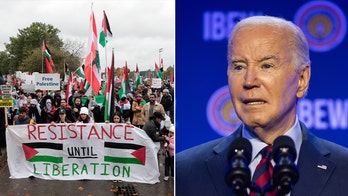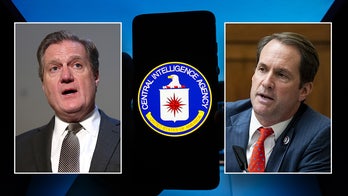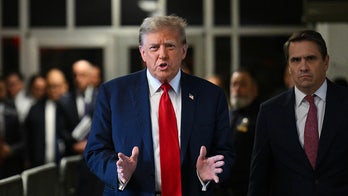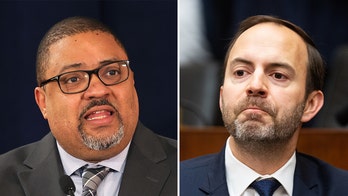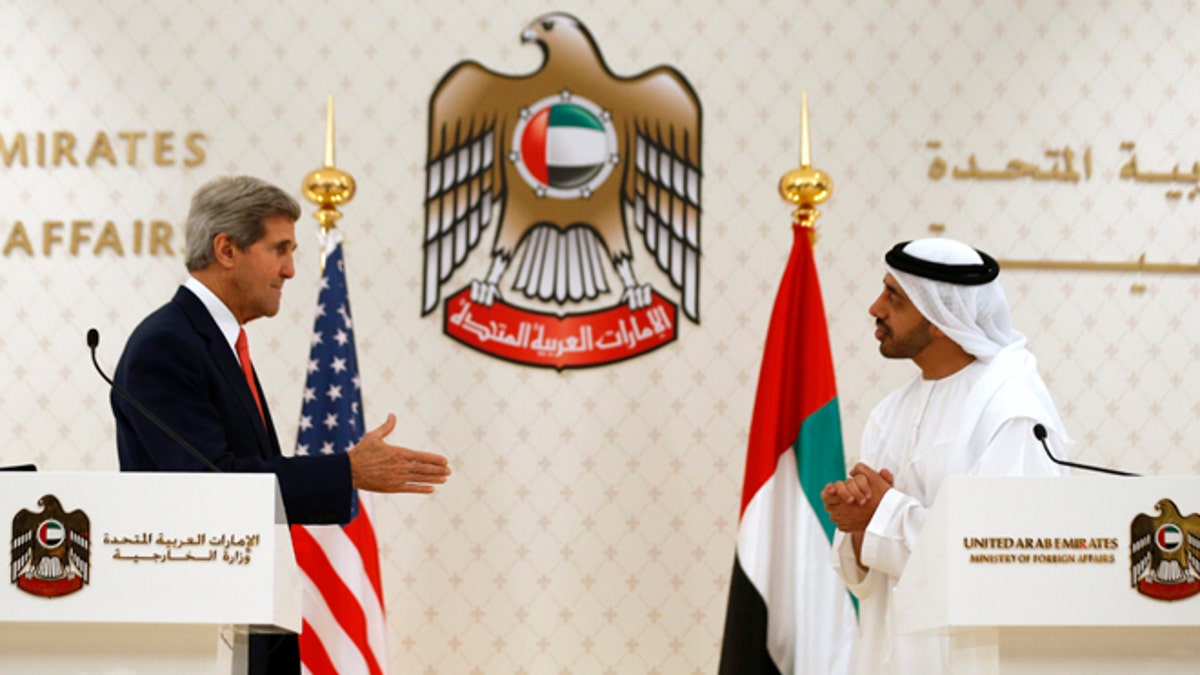
Nov. 11, 2013: U.S. Secretary of State John Kerry reaches out to shake hands with U.A.E. Foreign Minister Abdullah bin Zayed Al Nahyan in Abu Dhabi. The U.A.E. is one of the biggest buyers of U.S. arms. (Reuters)
U.S. arms deals with foreign governments have surged under the Obama administration, as part of an apparent push by the White House and State Department to have allies "share the burden" of providing security.
The increase, though, has raised concern that the weapons and military equipment could fall into the wrong hands or be used by unstable governments against their own people.
"With very little public debate, the Obama administration has embarked on a course that could undermine U.S. national security," the Center for International Policy cautioned in a report earlier this year, citing efforts to loosen export controls.
The sharp uptick in sales from U.S. weapons manufacturers has been tracked by the Stockholm International Peace Research Institute. According to its database, sales to foreign buyers rose from $6.9 billion in 2009 to more than $8.7 billion in 2012.
The United States now accounts for nearly one-third of all global arms sales.
And not by accident.
The Obama administration has launched a comprehensive effort to reform its own export rules -- effectively making it easier for defense companies to sell abroad. Plus, according to a report in the Boston Globe, administration officials now are personally lobbying foreign leaders to buy everything from warships to missiles.
The Globe cited one unnamed official as saying nearly all diplomatic exchanges with foreign officials now involve a sales pitch pertaining to U.S. defense companies. The sales are not just the government deals overseen by the Pentagon, but direct sales from U.S. companies to foreign capitals. Those are regulated by the State Department, which is led by Secretary John Kerry.
Asked for comment, the State Department directed FoxNews.com to a speech given this past April by Gregory M. Kausner, deputy assistant secretary in the Bureau of Political-Military Affairs.
In the speech, he talked about the challenge of balancing America's role as the "primary provider of security with the fiscal constraints of today's environment" -- and the need to increase "security cooperation" with allies so they "share the burden."
"In the end, though, our partners must take on an increased responsibility for their own security and that of their regions," Kausner said.
The speech reflected a broader effort by the Obama administration to nudge allies to do more while the Pentagon deals with an array of cutbacks.
To that end, Kausner used the speech to tout the administration's effort to ease regulations pertaining to certain exports. He called the system "cumbersome and complex."
To the delight of the defense sector, the administration has moved ahead with transferring oversight for some military equipment sales from the State Department to the Commerce Department, which would cut the red tape for certain transactions.
But critics warn the shift has risks.
"The Obama administration's loosening of controls goes far beyond anything contemplated by the Clinton or Bush administrations," the Center for International Policy warned, noting concerns that the changes could undercut laws meant to keep weapons and other material "out of the hands of terrorists, human rights abusers, or countries or groups seeking to develop nuclear weapons."
The American Bar Association's Center for Human Rights issued a detailed report on the changes earlier this year. The group called the overhaul a "worthy endeavor" but said the government must ensure it doesn't "fuel trafficking in small arms among insurgents and those engaged in human rights abuses."
The group said that handing over responsibility to the Commerce Department could allow some arms to "flow more easily into the international grey arms market" and into the hands of governments and people with terror ties.
According to 2012 data, the U.S. sells most its arms to about 10 countries, including South Korea, the United Arab Emirates, Turkey and Saudi Arabia. The sales covered everything from guided bombs to radar systems to missiles to tanks to helicopters.
The Obama administration has staunchly defended its efforts to overhaul the arms export system. A statement put out by the administration this past fall said the changes will "enhance, not ease" the restrictions on weapons to places like North Korea and Iran. The administration claims that with the changes, it will be "in a better position to devote resources to preventing exports to terrorists" and other dangerous destinations -- while improving cooperation with allies.
The administration argues the changes are meant in part to smooth the process for more minor items. "A minor component for an F-18 should not be controlled in the same manner as the F-18 itself," the statement says.
As Kausner said, part of the reason the U.S. makes arms deals is to build influence. He said bluntly in April that the deals give the U.S. "a tremendous amount of leverage" in diplomatic situations.
Indeed, as the U.S. increases its role in foreign arms deals, other countries are competing.
The Stockholm International Peace Research Institute reports that China recently became the fifth largest exporter of "major conventional arms" -- for the first time since the end of the Cold War.
In second place, behind the U.S., is Russia.

